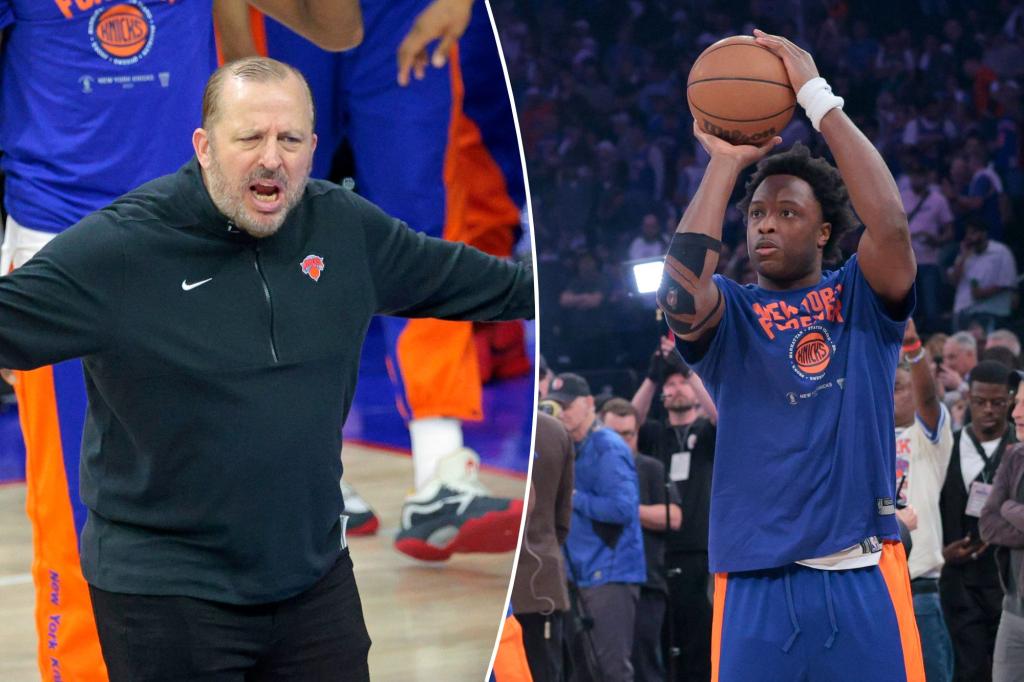First the Knicks take a breather, then the work restarts.
“Usually what we try to do is take a couple of weeks to recharge,” Tom Thibodeau said Sunday afternoon, right after the Knicks were eliminated by the Pacers in Game 7 of the Eastern Conference semis. “And then do the deep dive and figure the plan out.”
The offseason “plan” can be broken into two parts: internal and external.
The external — trades, free agency, draft — is typically more complicated, subject to variables way outside of a team’s control. The internal questions are more straightforward.
And here are the two categories the Knicks must address:
Own Free Agents
OG Anunoby
It’s the big-money “internal” question of their summer. After giving up Immanuel Quickley and RJ Barrett to acquire Anunoby, the Knicks aren’t in position to let Anunoby leave in free agency. This will be a contract well over $100 million. People around the league believe it lands in the average salary range of $30 million-$40 million. Of course, the market will help dictate some of the price. If the Sixers or Thunder, for instance, arrive with a massive offer, the Knicks — who own Anunoby’s Bird Rights — will be in the type of bidding war they don’t want. More than likely, Anunoby is coming back. And there’s risk associated with a massive commitment. The 26-year-old is injury prone, logging 50 games or fewer in three of the last four seasons. The Knicks have been tremendous when he’s healthy, but a big difference in the conference semis was Indiana had the ex-Raptor who was available (Pascal Siakam), while the Knicks got the ex-Raptor (Anunoby) who was hurt.
Isaiah Hartenstein
Since the Knicks are over the cap, they can offer Hartenstein only a contract that starts at roughly $16 million per season. It’s certainly possible Hartenstein fits into that type of deal — centers are devalued in the NBA — but there are enough teams with cap space (like the Pistons) who could pry him away from New York. Retaining Hartenstein took on heightened importance not only because of his jump in productivity this season, but also Mitchell Robinson’s unavailability.
Precious Achiuwa
He is a restricted free agent, meaning the Knicks could match any offer. This is a signing that will be dependent on the rest of the roster and how much depth they need at power forward.
Alec Burks
Burks resuscitated some of his unrestricted free-agency value with a strong second-round playoff series but not expecting a reunion next season.
Contract Extensions
Jalen Brunson
This is dependent on Brunson. He’ll get the offer. He can take the guaranteed extension (maxed out at four years, roughly $156.5 million) or risk waiting until 2025 free agency for more (five years, $258 million). Another option is to extend the contract for fewer years so Brunson gets money guaranteed but hits free agency sooner.

Julius Randle
He can get roughly four years, $190 million in an extension and he’s surely pining for it after signing a deal in 2021 that became a bargain for the Knicks. But an extension at such a high figure isn’t a savvy team-building move after Randle missed the season’s final four months and underwent shoulder surgery. He can become a free agent in 2025.
Tom Thibodeau
Thibodeau has one year remaining on his deal, and NBA coaches typically don’t make it to lame-duck status. Thibodeau publicly expressed a desire to stay with the team. If there’s no extension before training camp, this becomes a huge story and potential distraction.
Source









